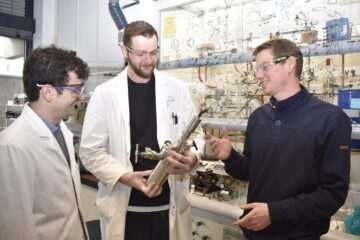Researchers Take Protection of Organic Products to Next Level

One key difference is that the traditionally cured pork products contain nitrate and nitrite. Nitrite is a chemical preservative that’s effective in inhibiting the growth of certain foodborne pathogens. Under government regulations, the organic products are not permitted to contain preservatives such as nitrate or nitrite.
Instead, the organics may contain vegetable products that are considered natural ingredients and that contain high concentrations of nitrate, which is acceptable because it is from a natural source. The vegetable-based nitrate makes the organic pork product look and taste like it was traditionally cured.
The problem is that the organic products, lacking the directly-added nitrite, don’t have the same level of built-in protection against pathogens such as Clostridium perfringens, Clostridium botulinum and Listeria monocytogenes.
“Consumers can’t tell the difference, except that they’re labeled natural and organic,” said Joseph Sebranek, an Iowa State University food science professor who is researching the case for the Food Safety Consortium. “From the standpoint of consumers, if they have a natural organic hot dog, it looks the same. The issue is if consumers expect that product to be identical in terms of handling requirements and refrigeration, and if they happen to do some temperature abuse, there is going to be more potential for problems to develop.”
Sebranek said his research team’s analysis has determined that naturally occurring nitrate is not present in the organic products at as high a concentration as the nitrite preservative is in traditionally cured products. But the level of concentration isn’t the only factor that affects the product’s ability to fight off pathogens. The researchers are reviewing what other formulations in the products could have an effect.
The research has found that there is a way to use natural ingredients to fight the potential of pathogenic contamination in organic products to make up for what nitrite isn’t present to do. Natural vinegar, lactate and lemon powder have recently become commercially available for use as natural preservatives in foods. Sebranek’s group tested their effectiveness against the pathogens and found them to be effective against L. monocytogenes and C. perfringens, although not to the extent that nitrite is effective in traditionally cured products.
More remains to be explored. Sebranek’s research group is studying other natural antimicrobial ingredients to determine their effectiveness against pathogens in organic processed meat products.
Media Contact
More Information:
http://www.uark.eduAll latest news from the category: Health and Medicine
This subject area encompasses research and studies in the field of human medicine.
Among the wide-ranging list of topics covered here are anesthesiology, anatomy, surgery, human genetics, hygiene and environmental medicine, internal medicine, neurology, pharmacology, physiology, urology and dental medicine.
Newest articles

Lower dose of mpox vaccine is safe
… and generates six-week antibody response equivalent to standard regimen. Study highlights need for defined markers of mpox immunity to inform public health use. A dose-sparing intradermal mpox vaccination regimen…

Efficient, sustainable and cost-effective hybrid energy storage system for modern power grids
EU project HyFlow: Over three years of research, the consortium of the EU project HyFlow has successfully developed a highly efficient, sustainable, and cost-effective hybrid energy storage system (HESS) that…

Safer alternative for an explosive reaction
The chemical industry has been using a reaction with explosive chemicals for over 100 years – now Mülheim scientists have discovered a safer alternative. The Ritter Group of the Max…





















